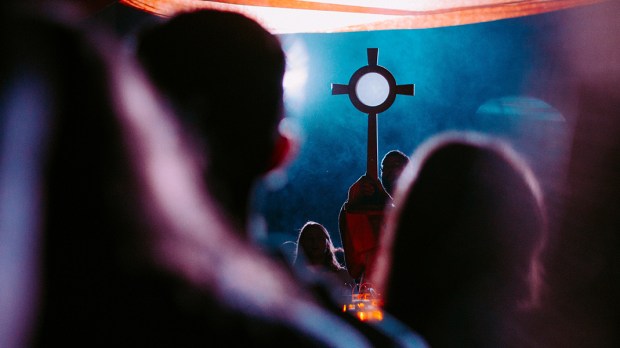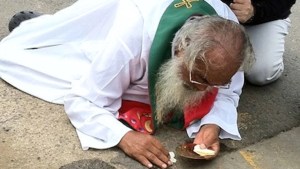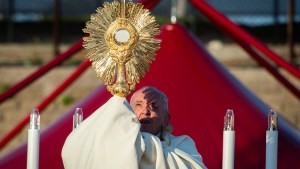The Solemnity of the Most Holy Body and Blood of Christ, that is, the feast we call by its Latin name Corpus Christi, is a celebration of the Eucharist, the source and summit of our faith. It is a day to reflect on this great mystery, to consider the teaching of Jesus, and the way the Church has illuminated and proclaimed that teaching. To that end, today, let us consider the teaching of Christ and the thoughts of saints who have come before us.
Jesus’ word
“While they were eating, he took bread, said the blessing, broke it, gave it to them, and said, ‘Take it; this is my body.’ Then he took a cup, gave thanks, and gave it to them, and they all drank from it. He said to them, ‘This is my blood of the covenant, which will be shed for many.’”– Mark 14:22-24
The Catholic teaching on the Eucharist is not an evolved theology. That’s to say the teaching about what the Eucharist is, is not a conceived thing, as if created by the Church. Catholics take the Lord Jesus at his word. We take his words to be true, knowing that Jesus would not deceive us. He says this bread is his body, and so we believe it is. The Eucharist is a gift, a revelation, something received from Christ, not a construct or imagination produced by theological reflection. Jesus gives us himself, his body, blood, soul, and divinity. He is truly present, hidden under the guise of bread and wine.
For those who believe
And this food is called among us Eucharistia [the Eucharist], of which no one is allowed to partake but the man who believes that the things which we teach are true, and who has been washed with the washing that is for the remission of sins, and unto regeneration, and who is so living as Christ has enjoined.
For not as common bread and common drink do we receive these; but in like manner as Jesus Christ our Saviour, having been made flesh by the Word of God, had both flesh and blood for our salvation, so likewise have we been taught that the food which is blessed by the prayer of His word, and from which our blood and flesh by transmutation are nourished, is the flesh and blood of that Jesus who was made flesh.
– Saint Justin Martyr (First Apology, 66)
St. Justin, called a Martyr since his gave up his life for the Christian faith, penned these words between AD 153-155. Think of that! Just a little over a hundred years after the life of Jesus, here we have St. Justin, offering rich theological reflection on the Eucharist. The Church’s theologians help enrich our understanding of the Eucharist. Over the years, through prayer and study, theologians have aided the Church in coming to better clarify and articulate the teaching of Jesus. But the principle truth is there, from the beginning, given by Christ: the Eucharist is Jesus’ body and blood.
St. Justin’s words call us to examine our own hearts before receiving Holy Communion. Have I been to confession? Is my life being lived following the Gospel teachings of Jesus? Do I take Sunday Mass lightly or appear disinterested or uninvested during Holy Mass? In the Eucharist, Jesus gives over his whole self to us. In return, we owe him our whole selves, our entire hearts.
You will see
Receive the sacrament in such a way that you think about yourselves, that you retain unity in your hearts, that you always fix your hearts up above. Don’t let your hope be placed on earth, but in heaven. Let your faith be firm in God, let it be acceptable to God. Because what you don’t see now, but believe, you are going to see there, where you will have joy without end.
– Saint Augustine (Sermon 227, preached on Easter)
St. Augustine teaches that the Eucarist signifies an invisible reality. Our hearts then, are united to this invisible reality, through consuming the Eucharist. The Eucharist is the food of pilgrims, of wayfarers, of people who have not yet arrived at their destination. We do not yet see the full reality signified by this precious bread of heaven. And yet we will, someday.
Undivided and entire
You receive all the divine essence of the sweetest Sacrament in the whiteness in the bread. Just like the sun cannot be divided in the whiteness of the Holy Host. Let us suppose that the Sacred Host could be divided: even if it would be possible to fragment the Holy Eucharist into thousands of tiny Particles, in each one of the tiny Particles there is the presence of Christ, the whole God and the whole Man. In the same manner that a mirror would shatter into thousands of pieces, the Sacred Host will not shatter or divide the image of God and Man that you see in the Host; the image of God and Man is in each fragmented part.
– Our Blessed Lord to Saint Catherine of Siena (Dialogue)
It was unusual in St. Catherine’s day (she lived in the 14th century) for anyone to receive Holy Communion daily. And yet Catherine received encouragement to do so. With great reverence, Catherine understood that each fragment, each particle, contained the whole Christ. Undivided, Christ gives himself entire to us. For St. Catherine, this gift of Christ was the motive for her service to the poor and to the sick. She was so conformed to the heart of Christ, the love of Jesus present to her in the Sacred Host, that she was able to love, to love deeply.
Embracing the cosmos
I have been able to celebrate Holy Mass in chapels built along mountain paths, on lakeshores and seacoasts; I have celebrated it on altars built in stadiums and in city squares… This varied scenario of celebrations of the Eucharist has given me a powerful experience of its universal and, so to speak, cosmic character. Yes, cosmic! Because even when it is celebrated on the humble altar of a country church, the Eucharist is always in some way celebrated on the altar of the world. It unites heaven and earth. It embraces and permeates all creation.
– Pope Saint John Paul II (Ecclesia de Eucharistia)
Wherever and whatever the character of the Mass celebrated, Christ is truly there. His bloody sacrifice of the Cross, offered once and for all on Calvary Hill, obtained for us the redemption of our sins. Whenever a priest offers the bread and wine, Christ makes these graces of redemption present for us, allowing us to be united once more with him. He draws us through this sacrament to himself, uniting us here and now below with the saints and angels in glory above.



